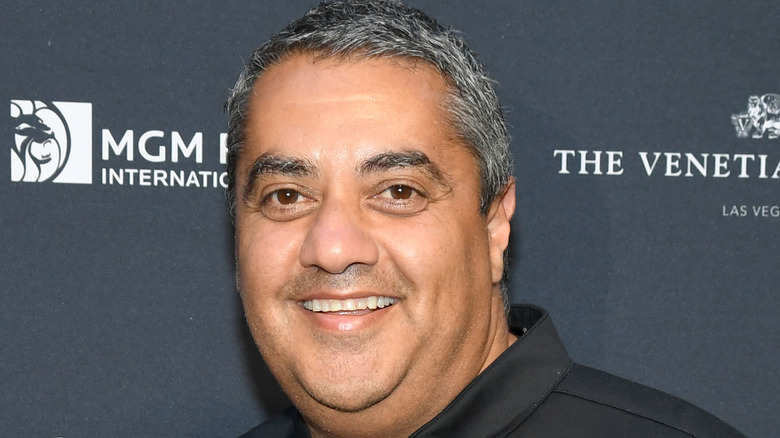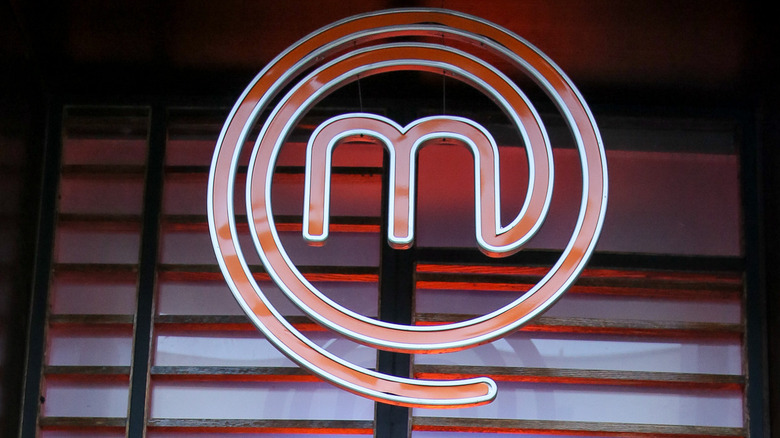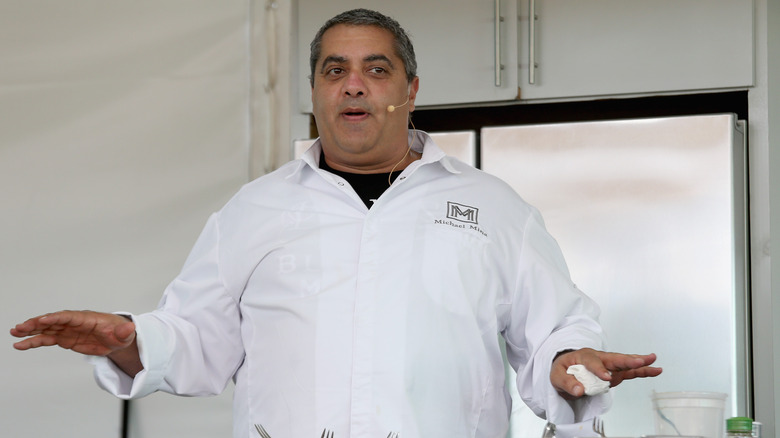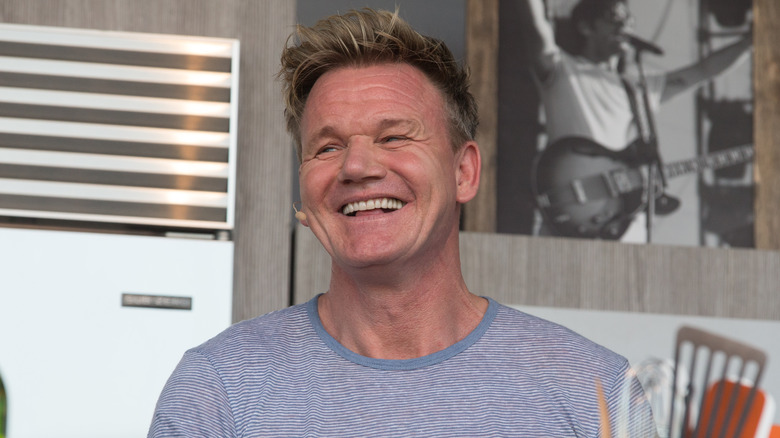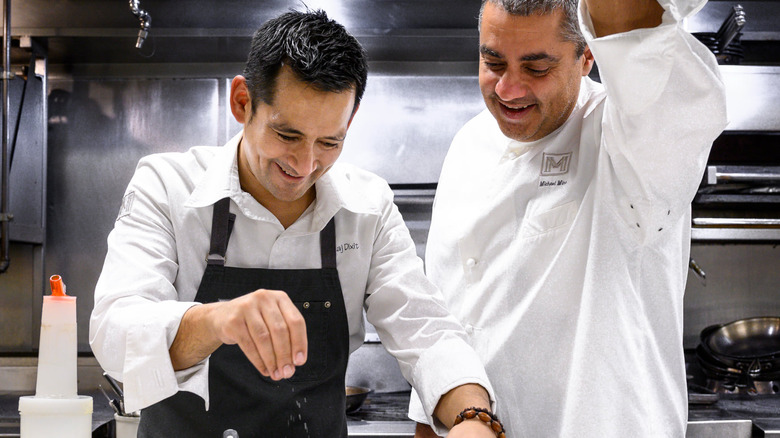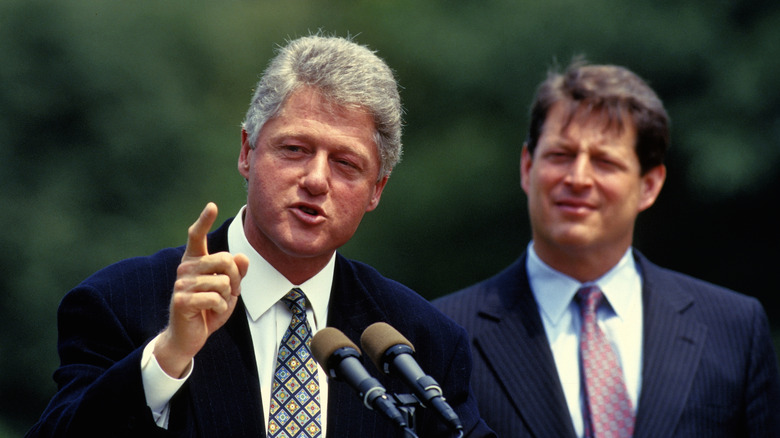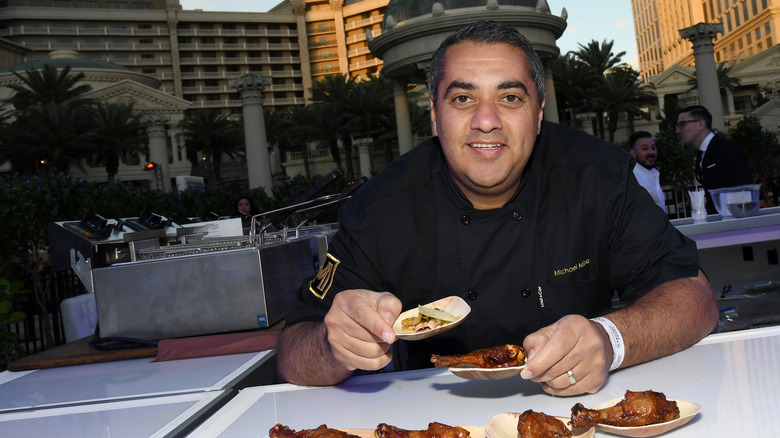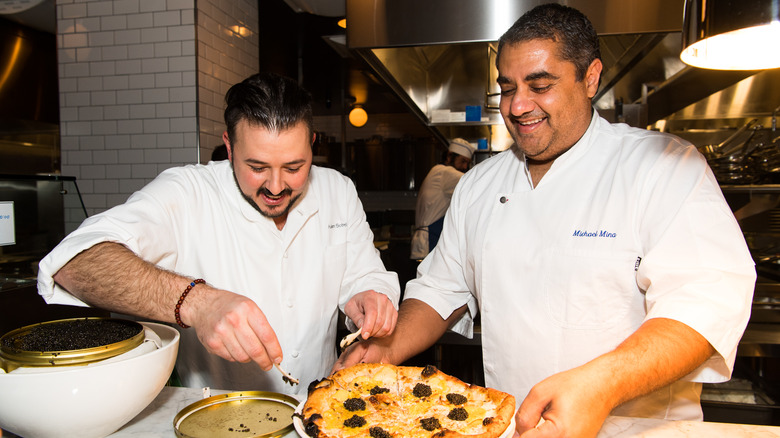Michael Mina Dishes On MasterChef: Legends - Exclusive Interview
Few chefs have the level of experience that Michael Mina has accumulated over the years. After cutting his teeth at the Culinary Institute of America, Mina moved to San Francisco and helped open AQUA, a haute cuisine restaurant that won a James Beard Award under his direction (via Michael Mina). In the years since the opening, Mina has gone on to judge cooking competitions and cook live on television programs over the years, has cooked for three U.S. presidents, and has collected an array of accolades and awards thanks to his refined cuisine.
Next, the chef will appear as a judge and mentor on "MasterChef: Legends” on July 7, as he leads a cooking demonstration with Gordon Ramsey and has to help decide which contestant has to leave the show (via Screen Rant). The episode, focused on the correct preparation of beef, guarantees to wow anyone who loves the idea of watching Ramsey and Mina go head-to-head to deliver a Michelin star-quality experience. In anticipation of the episode, Mashed caught up with Mina and delved into his experience on "MasterChef: Legends," what it takes to open up a slew of restaurants across the country, and his favorite items to cook.
Michael Mina delves into his MasterChef experience
From your perspective, what were some of the biggest challenges that the contestants had to deal with during [your] episode [of "MasterChef"]?
Well, obviously, our episode was right at the beginning of the pandemic, so I think that there was obviously that, and I'm sure people have spoken about that, and so I think that was on people's minds and so there is already that layer of stress. But, I got to say, I think that, if I had to spin the wheel and pick which episode that I would've been chosen to be on, I think I got the one that I would've wanted the most because I just thought it was really interesting the way that Chef Ramsay played it.
It's like, okay, when people think of meat, they're thinking primal cuts, they're thinking filet, they're thinking rib eye, and then you start to think of how many contestants and not knowing what you're going to pull and what you're going to draw and what you're going to end up with, and that was stressful because, you can imagine, a lot of these people have never even seen these products, better yet actually worked with them. And then the person that rolled the dice and got filet... To Chef Ramsay's credit, he's going to be a hell of a lot tougher on that person because he should be.
Michael Mina on translating TV challenges to real life kitchen scenarios
Would you ever have a mystery box situation in one of your kitchens?
Sure. I'm here in Hawaii right now and I can tell you right now, being at Fish House every day at 5, literally, the guys come back and they've got fish, at certain times, fish we've never even seen before, and whatever they catch. And that's the romance and the fun of it is like, oh, okay. We have fun with it. We'll talk to the fisherman and say, "What's this about? How deep was the water? What should we be looking for?" and then you start to play with what you're going to make with it. Now, obviously, we've been doing this for a long time. A lot of these young cooks that were on the show, you set them loose with a beef cheek, a beef cheek and not the exact amount of time you really need to cook it so you got to get creative, that's a different world.
Is there anything that [contestants] could practice in preparation for [the show]?
When you think about studying for these things, you look at these cuts and you probably had to really think about time management. That would be what I would say is, okay, you're going to get a sweetbread or a beef cheek, what are the different ways that you can cook it and have it be done in the amount of time that they were allotted to create the dish? Because the rest of the dish you can workaround, but there are certain things you can't just workaround. And, frankly, you're going to get judged on the whole dish, but you're obviously going to get judged on the protein pretty heavy.
Michael Mina shares what it takes to judge on MasterChef
You've judged a lot of food in your life and no one knows food like you do. What was it like being a judge on the episode?
It was amazing. I got to tell you, I said this earlier... what I love about [Chef Ramsay is] the fact that he's been able to, decade after decade, not only sustain being the prominent chef on television, but continually reinvent himself and bring the show to another level. It was nerve-racking, I got to be honest. I think I said earlier, it was more stressful than opening a restaurant would be for me because I do that more often. And it was nerve-racking in a way in which... it's quite a production, and so it's an intense production and it's not exactly what I do every day, but you also did feel for everybody that's on it, even though kitchens are intense and everything else, but just getting the backstories, some of it was pretty emotional actually.
[Were there any dishes] that fell flat from your experience?
Well, you knew it right away, but the thing about any of this is there is a reality... we always say, with a restaurant, everything's going to be challenged, you're physically going to be challenged, you're emotionally going to be challenged, you're mentally going to be challenged, you're going to be creatively challenged. When you put all that together in a pot and boil it, usually what happens is you end up starting to see disorganization, and you could see it right away. The stations that started getting dirty right away. And cleanliness goes away quickly, then things start to get disorganized. And those are the people that are going to struggle the most because it's really hard to hold all of that together and to keep it organized because, frankly, you need to keep it really clean and organized because that's the only way you're going to keep it clean and organized in your mind to get through it in that quick of a period of time.
Chef Mina's extended relationship with Gordon Ramsay
How did your experience this time compare with your work previously on "Hell's Kitchen"?
Well, it was a different beast this time entirely because, on "Hell's Kitchen"... god, I was so glad, honestly, to get to do this because I was really under the weather when I did "Hell's Kitchen." I'd been sick, and it was a dining room experience, where you're in the dining room and this was a much better experience for me because I'm a lot more comfortable in the kitchen and I enjoyed being in the kitchen and getting to see every step of how they got to where they got to.
Do you prefer to rather be cooking in the kitchen or to work more on the management side?
Oh, it's always going to be cooking in the kitchen. Yesterday was so fun because we reopened Stripsteak here in Hawaii and we just had such a good time. We had to do the daytime part, the management part of it, and everything else, but there's just nothing like it. There's nothing like the second the service starts and that first guest walks in the door and the smells and just the intensity and then just being able to walk out and talk to people after they eat. All of the rest of the business is a necessity because it gets you to that point, but that's not what you do it for. You do it for that period of time that you get to put food on a plate and you get to watch people eat.
Michael Mina's preferred ingredients
Do you have any signature dishes or maybe any particular ingredients that you just really love to cook or cook with?
Well, I'll give you the silly answer, but it's the only answer that really is true, it's all about seasonality and it's all throughout the year. Right now, it's great because it's corn, right, and it's all about corn and it's about tomatoes and it's about the products that you wait all year for, stone fruit. We obsess, we wait all year for these products and we're so excited we just have to not jump the gun, not say, "Okay, it's still three weeks early, but I want to use it so bad. It's almost good enough." But that's what it's really about.
What was it like getting your first Michelin star?
It was unbelievable because... anybody that says that it's just all about them, they're wrong. It's not. A kitchen, a restaurant, is a family and everyone works so hard and they are so ingrained in each other, for better or for worse, just like a family, right? And you work so hard for these accolades and, yes, there's times when you're the one that's having to lead it and to push it, but the reality is, when you get any award, especially one like that, the amount of joy that you feel in your restaurant, you can't put it into words. There's nothing that you can put into words.
It's not like, "Oh, I went and got a new car," or "I went and got a new house," or whatever it is. None of that even comes close to that feeling that you get when you and this group of people that have worked so hard to try to achieve something get acknowledged that way, and especially when you know that you're, at the same time, you're impacting your guests the way you want to impact your guests. If on a daily basis, you're impacting your guests like that and you see the joy and the happiness in your guests, and then you get the award, it's just so much sweeter.
Michael Mina remembers what it was like cooking for Bill Clinton
What was it like cooking for the presidents?
Yeah, yeah, all very different experiences, but it was, again, when you think about that ... I grew up in a small town in Washington state. I was an immigrant from Egypt and the fact that you get to cook for the president of the United States, and not just get to cook for him, cooking for somebody is something that, as we all know, is very personal, right, and then, when you get to cook for him and then you get to talk to him, they comment to you about what they ate, it's pretty surreal actually.
Was there anything during those experiences that you weren't expecting?
I can tell you, President Clinton, he actually came to the restaurant, my restaurant in Vegas... and he was obsessed with learning how the bread was made. He was all over. We were in the kitchen. I didn't expect that. He literally probably spent 15 minutes at the bread oven. I didn't expect that.
Michael Mina dishes on what it takes to open a restaurant empire
At this point too, you have so many restaurants under your belt. Do you have a guiding principle that comes into play when you open up a new location?
Sure. First of all, a lot of what I am doing now, and a lot of the restaurants that we do now, they really are truly partnerships with other chefs. And so I have so many great chefs that I've been able to be blessed to know and/or work with are in our company and/or known them as friends and maybe they didn't have the infrastructure to grow and to go outside of their one restaurant or whatever. And so that's really been a lot of what we've been doing of late is just having these really great relationships. And it's a lot of fun because it's great for our team because, if you want to do Japanese food and you get to partner with Ken Tominaga, it's not like I'm going to be the person that says, "Oh, I was in Japan for 25 years and learned how to do nigiri perfectly."
That's not true, right, and there's no reason to say that or do that. But then, when you get to partner with somebody like that and then your whole group gets to learn from that, that's pretty magical, and so that's been our guiding light... If we're going to do something, we want to partner with the right person. Obviously, there are cuisines that I still will always do myself, but when we do something that's maybe a little outside of the box, we'll partner with somebody.
What Michael Mina eats in a typical day
What do your average meals look like over the course of an ordinary day?
Usually, pretty light, usually, just fruit in the morning, something really, really light in the morning, and then lunch ... I love seafood and, speaking of Ken, I'm very blessed because a lot of times, I eat raw fish, and probably too much raw fish, but a lot of raw fish, a lot of sushi, a lot of sashimi, salads, things along those lines. And then dinner is usually a little bit more of that. If I'm not working, I love to cook outside, and I think just cooking over a wood-fired grill, to me, is always, or a wood oven, is always going to be where I want to cook and what I want to eat and so that's, a lot of times, what we do. And then my wife is half Italian/Puerto Rican and we'll eat pasta every night of the week. So usually it's something grilled with some pasta.
If you want to see how a Michelin-ranked chef handles himself in the kitchen, make sure to watch "MasterChef: Legends" July 7 at 8 p.m. on Fox to catch the action and find out which contestant gets the boot from Chef Mina.
